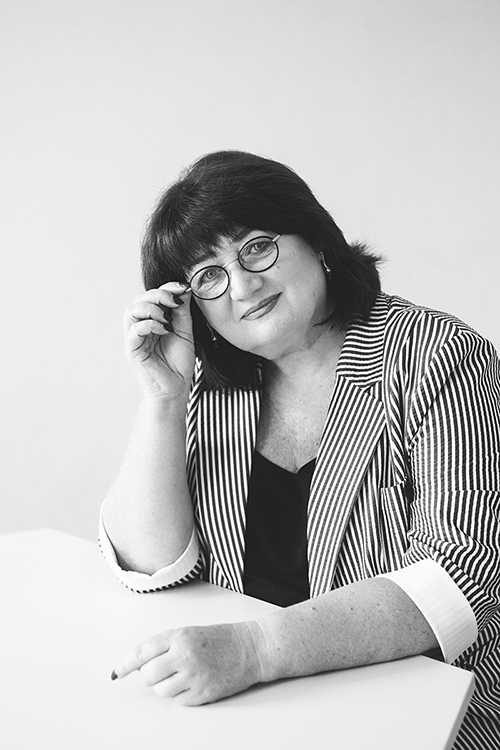This interview was organised by Human Rights House Crimea for the third edition of the “Portraits of Strength” photo exhibition and is also available in video format. The photo was taken by Hanna Liut, in “Almenda” office, Kyiv, Ukraine, August 2024.
When did you realise you were a human rights defender?
“It’s not easy for me to pinpoint the moment when I became fully aware that I was involved in human rights work. For a long time, I believed that educational activities in the field of human rights weren’t exactly related to human rights advocacy.“
“This changed in 2014, when Russia’s armed invasion of Crimea took place, transforming my work and involvement into human rights advocacy.”
What is the nature of your work and what challenges do you face as a Woman Human Rights Defender?
“Since 2014, I have been actively involved in human rights advocacy, focusing on the protection of the right to education of children and young people living in the occupied territories and determining how best to defend these rights. Gradually, other issues began to surface, spreading like ripples in water.”
“My work now includes conducting extensive analytical research, and participating in direct and indirect actions—ranging from meetings with government officials to analytical criticism of government actions that affect certain vulnerable groups. Thus, my work encompasses nearly all aspects of human rights advocacy, except, perhaps, legal representation in court.”
What is the current human rights situation in your country?
“The current human rights situation in Ukraine is complex and directly linked to the ongoing armed conflict, which began in 2014 and escalated into a full-scale war in 2022. Assessing the state of human rights under these conditions is challenging, as the requirements of international humanitarian law add to the need to uphold human rights.”
During armed conflict, the country finds itself at the point where certain human rights restrictions become legitimate. However, the primary challenge is maintaining the proportionality of these restrictions.
“Working as a human rights defender in such conditions [of ongoing war] is challenging. The state may accuse defenders of benefiting the aggressor state through their criticism, and society might perceive this as accurate. As a result, human rights defenders become a very vulnerable group, and this vulnerability is significantly heightened during armed conflict.”
What kind of human rights situation in your country would you like to see in the next 30 years?
“In 30 years I wish for an end to discrimination, for the government to support human rights defenders, and for all human rights and defender protection standards to be strictly observed.”
“Unfortunately, I live in a country that has been at war for a decade. War brings both challenges of armed conflict and serious human rights challenges. After any war, time is needed for recovery.”
“However, I hope my country will continue its journey toward upholding human rights standards. I dream that nearly every citizen will understand human rights and why they are vital for society and each individual. Perhaps this is my truest aspiration—for society to develop a deep awareness of the importance of human rights.”
Can you describe your motivation to be a human rights defender?
I became a human rights defender not out of a conscious choice but because of being outraged by injustice, especially when it affects [children].
“It’s incredibly challenging. That’s why I often recall the poem [“Kameniari” (ENG: ’The Stonecutters’), by Ukrainian poet Ivan Franko]:
“Scale down this cliff! Let not the heat nor the cold
Dare stop us! Withstand the difficulty, and the thirst, and hunger.
For it is designated for you to break down this rock.”
“Scale down this cliff!” – this has become almost a personal motto for me.”

About Portraits of Strength
Women human rights defenders (WHRDs) work to protect and advance freedoms while facing discrimination and stereotypes about their role and participation in society.
HRHF seeks to honour and promote independent women human rights defenders and their work through the “Portraits of Strength: Women Defending Human Rights” photo exhibition and highlight the human rights situation in the countries of the Network of Human Rights Houses.
The exhibition, now in its third edition, shares portraits and stories from WHRDs working on a variety of issues including the documentation of human rights violations and alleged war crimes, rule of law, women’s rights, political prisoners, freedom of expression, and more.
Find out more here.





